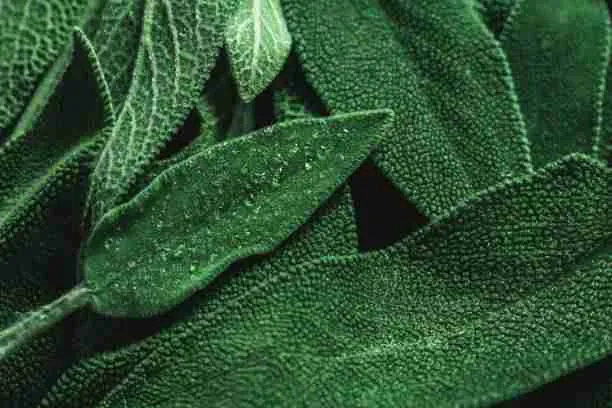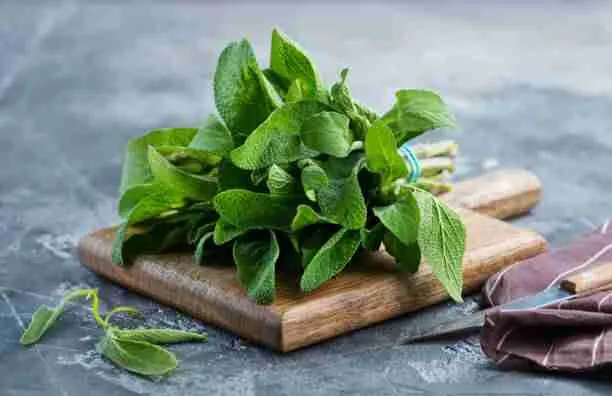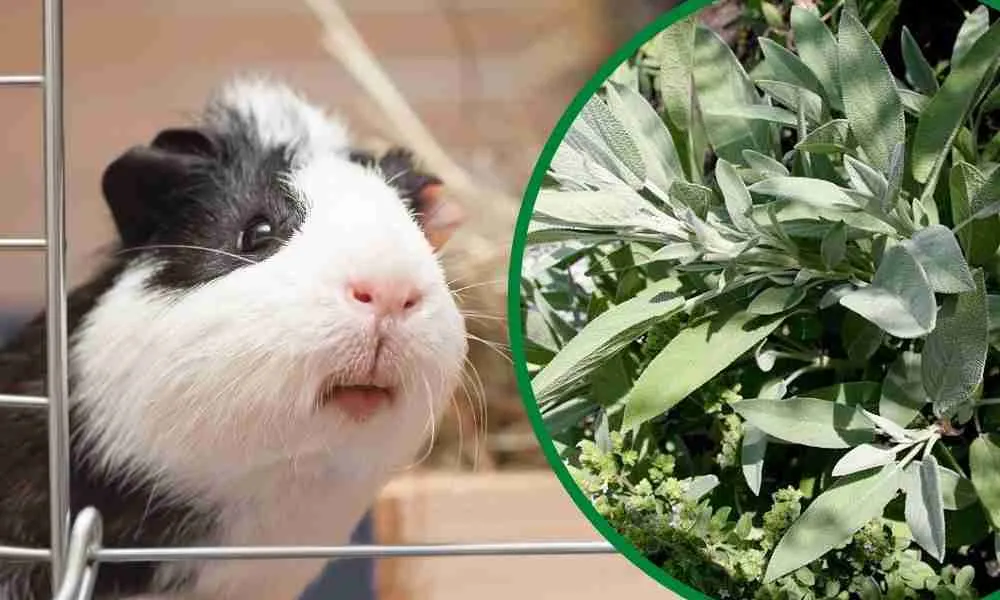Sage is a healthy herb that adds flavor to many dishes. Its aroma is just so great that you might want some to your cavy. But is this a good idea? Can guinea pigs eat sage?
Yes, guinea pigs can eat sage. These herbs contain vitamin K, B-6, and antioxidants that can help keep guinea pigs healthy.
However, you should only serve moderately, about 2-3 leaves per serving. Sage contains essential oils and other substances that can harm your cavy only in excess amounts.
Now that you know that your guinea pigs can eat sage, let’s look at the nutritional value it has for guinea pigs.
Table of Contents
Nutritional Value of Sage
| Nutrients | Amount Per 100 g |
| Calories | 315 Kcal |
| Carbs | 61 g |
| Vitamin K | 1714 ?g |
| Fiber | 40 g |
| Vitamin C | 32 mg |
| Vitamin A | 5900 IU |
| Potassium | 1070 mg |
| Iron | 28 mg |
| Protein | 11 g |
Health Benefits of Sage for Guinea Pigs

Boost Immunity
Sage contains antioxidants including vitamin C and A, which help to fight different diseases in your cavy’s body.
One of the common diseases this herb will help prevent is scurvy. Guinea pigs suffer from it when they lack vitamin C which their bodies fail to produce.
So feeding them sage treats that have vitamin C and other antioxidants will strengthen their immunity against many diseases that may come up in your cavies body
Improves Vision
This herb has vitamin A and beta-carotene in it. These two nutrients are excellent sight-boosters and can help to keep the eyesight of your little pet in good condition.
This benefit is very important for older guinea pigs who normally experience poor sight. This way, they can have a clearer vision and won’t have problems recognizing you.
Helps in Wound Recovery
Sage contains lots of Vitamin K. This is very important in wound recovery. These vitamins help to create the protein that clots blood.
Guinea pigs will benefit from this as they wouldn’t have to bleed too much whenever they get injured. Moreover, as the blood clots quickly, the healing process will also be quick.
Supports Cardiovascular Health
Sage also has potassium in it. This nutrient promotes good heart rate and good breathing as they help heart muscles contract properly.
In addition, potassium helps to lower high blood pressure in guinea pigs. This way, it prevents the health problems high blood pressure could cause to your cavy’s heart.
Good news! Sage is a cholesterol-free herb so it won’t cause blockages in your guinea pig’s blood vessels. This will allow blood to flow freely to and from the heart.
In all, feeding your guinea pigs sage will help keep them safe from different heart-related issues
Risks to Consider When Feeding Sage Rind to Guinea Pigs
Allergy
When guinea pigs try out new foods, they can develop food allergies. This is a common allergy to guinea pigs as they have sensitive pets.
Just like humans, not all guinea pigs experience an allergy to the same food. Some guinea pigs might not experience any allergic reactions when they try out any new food.
These reactions can be changes in stool and skin irritations. This is why you need to introduce sage slowly into their diet.
Poisoning
The essential oils in sage can be very poisonous for even humans not to talk of our sensitive guinea pigs. Sage also contains a chemical, thujone, which acts as a toxin when taken in excess.
This chemical can affect your guinea pig’s nervous system. So, if you give your cavy too much sage, you might end up poisoning them.
How Often Can Guinea Pigs Eat Sage?
You should offer sage to guinea pigs for just two days a week. Guinea pigs cannot eat sage every day. They should only have it as treats and not as regular food.
You can also give some gaps between the two serving days. It should never be straight!
Use the table below to guide you on the particular days to feed sage to guinea pigs.
| DAILY SCHEDULE | |
| Monday | Feed sage |
| Tuesday | Skip |
| Wednesday | Skip |
| Thursday | Skip |
| Friday | feed sage |
| Saturday | Skip |
| Sunday | Skip |
Moreover, you should only give your guinea pigs 2-3 leaves per serving. This helps keep things moderate as too much sage can harm your cavy’s health.
You should also introduce sage into a guinea pig’s diet gradually.
Pro Tip: let your guinea pigs try out sage in very small amounts. Start with a small leaf and then watch for any reactions.
If they seem to be fine, go ahead and offer them the normal serving amount.
However, if they start to act funny after eating it, you should reduce it the more till they get used to it.
How to Prepare Sage for Guinea Pigs?

Now we’ve come to an important part where you would be serving sage to guinea pigs. You need to prepare sage the right way for your furry friends.
Here are 3 simple steps below that can help ensure you get it right.
Step 1: Select Fresh Sage
You should pick only good sage to prepare as treats for your guinea pigs. Never use leftovers or already dried-up sage leaves.
Remember, you should use only raw and fresh sage.
Step 2: Wash Sage Thoroughly
This step isn’t one you should skip at all. Hygiene is very important when feeding guinea pigs. Sage can have pesticides on them and dirt.
You should wash sage very well to get rid of chemicals, dirt, or even bacteria that might be on them. You can do it under running water or preferably in a bowl of water.
Step 3: Serve Small Amounts of Sage to Guinea Pigs
After washing sage you should serve just 2-3 leaves to your cavy. Moreover, you should do this on clean surfaces.
Take Note!
Whenever your cavy is done eating sage treats and there are leftovers, you should always get rid of them. These leftovers are normally exposed to bacteria and flies, which you wouldn’t want your cavy to eat.
As sage in stores normally has traces of chemicals on them, it’s safer to use homegrown ones. If you can grow sage at home for guinea pigs, it’s worth the health of your little pets.
What Other Herbs Can I Feed My Guinea Pigs Besides Sage?
You should know that not every guinea pig likes sage. Guinea pigs can be picky about what they eat. They have preferences!
So, if you need to feed them other herbs besides sage, you can pick some for the table I made below…
| Parsley | Arugula | Fennel |
| Mint | Thyme | Oregano |
| Dill | Cilantro | Basil |
| Bay leaves | Endive | Chervil |
| Chamomile | Rosemary | Marjoram |
Pro Tip: Before feeding any of these herbs above to your cavy, you should look out for the right serving sizes. Most of these herbs are only safe in moderation.
Also, wash them properly before use, especially the ones you buy from stores as they can have chemicals, like pesticides on them.
Final Thoughts
In summary, guinea pigs can eat sage. These herbs contain vitamin K, C, fiber, and many other important nutrients for guinea pigs.
However, they are only healthy in small amounts. Never offer your furry friends too much sage! You’ll end up making your pet seriously sick.
Although sage has some health benefits for guinea pigs, they also contain substances like essential oils and chemicals.
These substances can be very toxic for your pets, especially when you feed your guinea pigs too much of it. So, to keep your little pets safe, you have to keep things moderate.
In addition, serve only fresh sage, and never forget to wash this plant before letting your cavies have them. This is very important.
You should also avoid any form of cooked sage. Guinea pigs don’t do well with cooked foods. Cooked sage won’t even have any benefits to offer to them.
Hopefully, you found this article very useful, don’t forget to share it with other guinea pig lovers like you!
